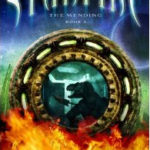Dark Is The Stain: The Song & Dance
“They are like children who sit in the market place and call to one another, and they say, ‘We played the flute for you, and you did not dance; we sang a dirge, and you did not weep [mourn].’”
(Luke 7; CR Matthew 11)
I’m admittedly re-contextualizing this verse. The context is that John the Baptist is in prison. He learns what Jesus had begun to do and sends his disciples to investigate and ask Jesus a question: “Are you really the one?” It’s no small question. John has been resolute in his faith in Jesus’ identity from the womb. But now, with his Messiah here in the flesh, he’s rotting in prison wondering if he’ll be released or beheaded. This is John’s lowest, most desperate moment. The strong man suddenly isn’t sure. Jesus’ reply is a paraphrase of a chapter of Isaiah meant to reassure John of his own faith (he does, some note, also leave out the verse that might indicate to John that he would be released from prison, something John would have noticed). He then commends John and tells everyone that, not only is John the “greatest man born of a woman” but that “the least in the kingdom” would surpass John.
The public response is that they “acknowledged God’s way of righteousness, because they had been baptized with John’s baptism. But since the Pharisees and experts in the law had not been baptized by him, they rejected the plan of God for themselves.”
Jesus’ reaction is “To what shall I compare this generation, and what are they like? They are like children sitting in the marketplace and calling to each other: We played the flute for you, but you didn’t dance; we sang a lament, but you didn’t weep!” He then goes on to express his frustration, contrasting the public reaction to John – who did not eat or drink – with the reaction to Jesus – who did the reverse. John comes in a spirit of mourning, so to speak, and was accused of being demon-possessed. Jesus comes in a spirit of celebration only to be accused of gluttony, drunkenness, and associating with sinners (which made him one by proxy).
Then he says, “Yet wisdom is vindicated by all her children.”
And afterward comes Jesus’ call to throw your burdens on him (in Matthew), followed by the famous moment with the woman who breaks a jar of oil and anoints him with expensive oil and her own tears (in Luke). “He who’s forgiven much, loves much; he who’s forgiven little, loves little.”
I could probably spend all day in the text, there’s so much to glean out of it, and this is but a poor, cursory version out of some church brat notion I should at least give some semblance of the original intention; but where I really want to spend our time is on Jesus’ frustration: Whether he calls his people in a spirit of celebration or comes weeping, they reject him. The plea is to stop being so impossible to please, to be satisfied with him.

As entertainers and communicators, I think we can all relate to that one way or another. You pour countless amounts of time, energy, and emotion into something, and sometimes it just feels like no matter what, you can’t please the audience.
I remember an intermediate fiction writing class I took. For my first assignment, I wrote in a very surreal, symbolic light – almost magical realism, maybe. No one got it. It confused everybody, and the only thing they could agree on was the setting, which was identifiable only because everyone in the room knew the location and therefore could figure out the location with only a scarce description. So, for my second, I took the reverse approach and imparted only one symbol and used a trope setting and situation. This time it was cliche, but they did figure out the symbol. Frustrated, I still had one more story to write for this class. This time I took a story a friend told me and simply wrote the events as he told me with no embellishment. And, this time, they read more symbolism into that simple little story with no layers whatsoever than I thought possible.
 I also recall a time that a woman flipped out on me because I wrote the word “godforsaken” and another time when a fellow writer lamented how “sterilized” Christian fiction is.
I also recall a time that a woman flipped out on me because I wrote the word “godforsaken” and another time when a fellow writer lamented how “sterilized” Christian fiction is.
Insatiable.
Unappeasable.
I wrote a tale for you,
but you didn’t listen;
I journeyed life and death and all between,
but you didn’t join me.
He came to his own, but his own didn’t know him.
I gave you my heart, but you wouldn’t take it.

So what do we do? Dance with one audience, we lose another. Play the flute for another audience, lose the one. Maybe the truth is we can’t please everyone, so we please no one. Maybe we pick which we’re going to ostracize. Maybe there’s another answer we haven’t seen.
“Choose the audience you have to offend.”
~John Maxwell












































Great post, Kaci.
I’ll have to share this on Facebook later today.
The only answer, I think, is to write what you want to read. Sooner or later the public taste will swing your way and you’ll be golden. What was once will be again and all that jazz.
The site cut my post short again:( I was going to say that I have been experiancing this in class. I absolutely hate my modern realistic story, and most other people like it, if not love. If they like that junk, why is it so hard for some to understand what I think is my good stuff, my fantasy stuff.
I sort of like the proverb “Neither seek nor shun the fight,” which I got from a Michael Phillips book about ancient Scotland.
Galadriel, I have a friend who experienced similar frustrations with her art classes. The bulk of the university program, faculty, and students favored modern art, which my friend hates. Her true genre is a bit more traditional, and her favorite medium is water color. It was a fight for her to keep that perspective in the face of that much frustration and external pressure. But be encouraged; just because it’s not to someone’s personal genre taste doesn’t make it not good. Getting modern realist lovers to like fantasy is about like getting me to love romance. Unless you’re someone who can appreciate the skill without finding the product appealing personally, it’s just not going to happen.
So…show it to people who like fantasy once you’ve submitted it. That’ll help. 0=)
I keep coming back to this. As a writer, as a blogger, as a youth director, as someone who ends up typing out these excessively long answers to the question “Can you help me with…” it was such a relief to see someone else saying this happens to them, too. More importantly, it was a tremendous comfort to see that Christ (again) knows perfectly well even the most mundane trials we face.
Not only that our efforts are taken for granted.
Not only that our words are turned on their heads.
Not only that people find meanings in our words that we explicitly attempted to avoid.
But all of the above.
Thanks for the great entry!
Kaci, you’ve given us so much of importance here — thank you!
It seems that, as Kessie commented, we should write what we like. This means more than that, I thing. It means to be true to the person God made us to be, to please Him, to expect to be disappointed or thrilled by responses at times — in everything to seek what He calls us to do.
Maria
Kaci,
I linked to this post in the intro to my latest story at:
http://christianfantasyforwomen.com/2012/02/23/judiths-diary-a-tale-of-bluebeard-and-bluebeards-wife/
If anyone wants to read my take on Bluebeard, and respond with LOVE or HATE, that would be great.
Maria
I mostly liked the picture of the kitten on the piano…just kidding. As always, Kaci, you are deep and thought-provoking.